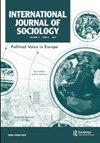Global Neoliberalism as a Cultural Order and Its Expansive Educational Effects
IF 1.8
Q2 SOCIOLOGY
引用次数: 11
Abstract
Abstract The global neoliberal era has sparked a burgeoning literature. Most accounts emphasize the political economy of the period, focusing on global markets and privatization. By contrast, we conceptualize neoliberalism as a broad cultural ideology that has reshaped how we think about people and institutions in all arenas of life, not just the economy. We delineate three main assumptions of neoliberalism as a cultural model. First, neoliberal ideology re-envisions society as consisting not of structures but of individual human persons who are attributed immense agency, entitlement, and rationality. Second, the neoliberal model redefines natural and social contexts in a manner that supports such imagined human actorhood, depicting them in terms of abstract rationalistic principles that apply universally. A third assumption, building on the previous two, is that progress is seen as emerging from universalized and abstracted human knowledge, rather than, for instance, from the material capacities of the state. Altogether, these assumptions amount to a dramatic cultural shift with broad consequences that include, but stretch far beyond, free markets. We illustrate these consequences by considering their expansive effects on education, drawing on existing studies and descriptive data. Overall, we expand sociological understandings of the cultural dimensions of neoliberalism.全球新自由主义作为一种文化秩序及其广泛的教育效应
全球新自由主义时代引发了文学的蓬勃发展。大多数论述都强调这一时期的政治经济,侧重于全球市场和私有化。相比之下,我们将新自由主义概念化为一种广泛的文化意识形态,它重塑了我们对生活各个领域(而不仅仅是经济领域)的人和制度的看法。我们描述了新自由主义作为一种文化模式的三个主要假设。首先,新自由主义意识形态重新设想社会不是由结构组成,而是由个体组成,个体被赋予巨大的能动性、权利和理性。其次,新自由主义模式以一种支持这种想象的人类行为的方式重新定义了自然和社会背景,用普遍适用的抽象理性主义原则来描述它们。第三个假设建立在前两个假设的基础上,即进步被视为来自普遍化和抽象的人类知识,而不是来自国家的物质能力。总之,这些假设构成了一场戏剧性的文化转变,其广泛的影响包括(但远远超出)自由市场。我们通过考虑它们对教育的广泛影响,利用现有的研究和描述性数据来说明这些后果。总的来说,我们扩展了对新自由主义文化维度的社会学理解。
本文章由计算机程序翻译,如有差异,请以英文原文为准。
求助全文
约1分钟内获得全文
求助全文

 求助内容:
求助内容: 应助结果提醒方式:
应助结果提醒方式:


